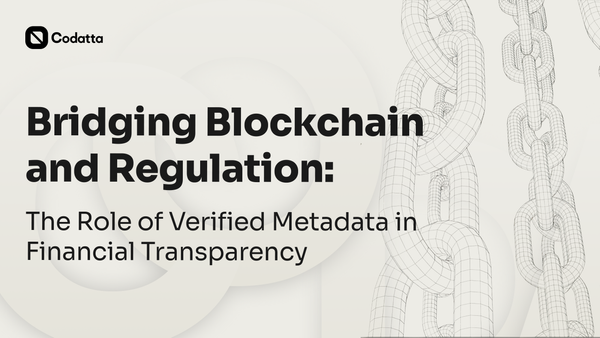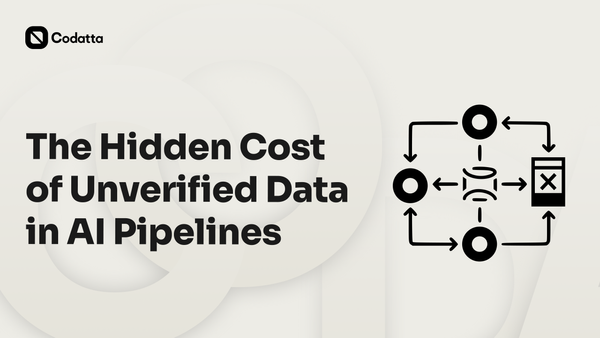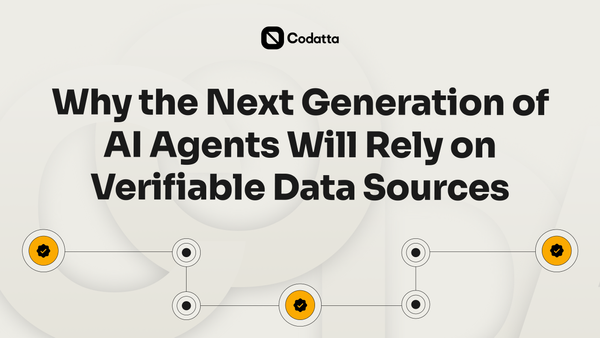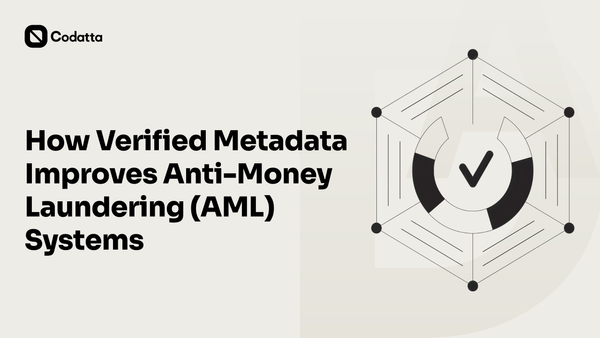Why Transparent Data Matters in Public Research and Academia
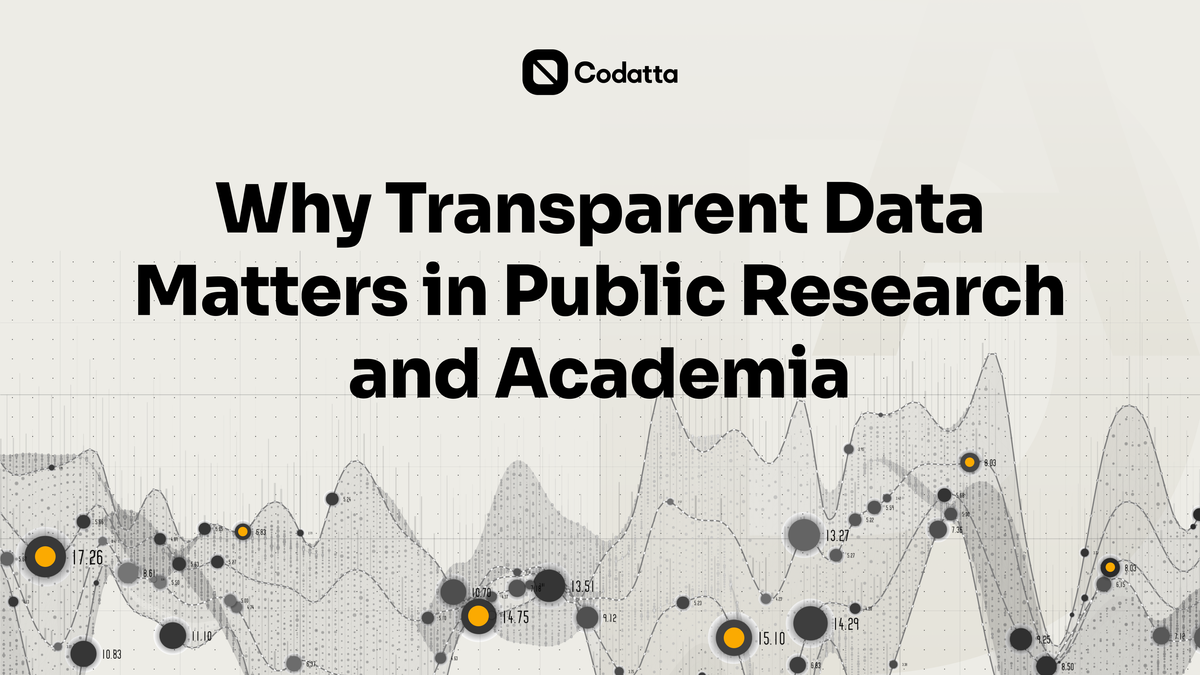
Scientific progress depends on transparency, yet reproducibility remains one of research’s biggest challenges. A 2023 Nature survey found that more than 70% of researchers were unable to reproduce another scientist’s results, raising questions about data access, documentation, and credibility. When research findings lack traceable provenance or standardized validation, collaboration and accountability weaken across the academic sector.
Transparent and verifiable datasets are now essential to ensure that science remains open, reliable, and impactful. Codatta’s decentralized framework supports this goal by providing traceable validation and data transparency that enhance research integrity and enable future innovation.
Read on to learn how open data and verifiable provenance are redefining trust in research.
The Cost of Opaque Data in Research
Opaque and poorly managed research data remain a major obstacle to scientific progress. When studies are published without complete metadata, use inconsistent formats, or remain locked in closed repositories, collaboration becomes fragmented and the value of research decreases over time. Researchers often struggle to validate earlier findings or reuse existing datasets, which slows innovation and limits transparency in research.
According to the OECD’s “Data for Science and Innovation” (2024), limited data access and inconsistent documentation practices cost the research sector billions annually through duplication of work and delayed analyses. The UNESCO Open Science Framework (2023) reports that a lack of data transparency and poor accessibility reduce global research efficiency, restrict public trust in published results, and discourage collaboration between institutions. These challenges directly affect the credibility and openness of research, especially when data cannot be verified or shared for further evaluation.
Inconsistent provenance records and closed repositories also affect the development of artificial intelligence and data-driven research. Without clear documentation, AI systems trained on such data risk amplifying bias or producing unreliable results, making it difficult for academic teams to publish credible findings that others can build upon.
The FAIR Principles provide a global baseline for improving research transparency. They encourage practices that make data Findable, Accessible, Interoperable, and Reusable. Following these standards helps researchers provide access to well-documented data, empower reproducibility, and ensure that academic work supports cumulative knowledge rather than isolated results.
For the research sector, investing in open data infrastructure is not just an ethical decision but a practical one. Transparent data governance, consistent metadata, and verified provenance strengthen accountability, reduce duplication, and enable impactful analyses that advance both science and innovation.
What Transparent Data Enables
Transparent data transforms how research institutions, policymakers, and scientists collaborate. When datasets are openly available online, with clear provenance and confidence indicators, it becomes easier to validate research methodologies, replicate results, and foster evidence-based policymaking. This level of openness allows other researchers to trace raw data back to its source, review methodology choices, and assess whether conclusions hold up under new analyses.
Peer review and meta-analysis both rely on accurate and accessible data sharing. Studies published without complete documentation make replication nearly impossible, weakening the norm of scientific accountability. The European Commission’s 2024 policy on open science and data sharing emphasizes that publicly funded research should maintain open, auditable datasets to strengthen trust and transparency across academic disciplines, from social science to biomedical research.
Transparent data also supports more credible citation practices. When datasets carry verified provenance and consistent metadata, they can be reused confidently across different studies, leading to stronger insight and broader collaboration. This foundation benefits emerging academic tools that use machine learning to scan, summarize, and connect findings, ensuring that automation in research remains grounded in reliable and verifiable data.
Such transparency promotes fairness, reinforces scientific integrity, enables replication, strengthens accountability, and helps institutions build a sustainable framework for research transparency and long-term innovation.
How Codatta Supports Open and Transparent Research
Codatta supports open and transparent research by providing a decentralized data protocol that allows verified annotations and full provenance tracking. Researchers and independent contributors can label, timestamp, and validate datasets through visible audit trails, ensuring that every data point used in academic analyses can be traced back to its origin and review history.
The protocol does not store publications but strengthens quality research through verified metadata and contributor reputation. This helps editors, reviewers, and research institutions interpret findings with greater rigour and confidence. Codatta improves the ability to share data, analyze complex results, and maintain accountability in methodological design. This approach encourages collaboration and innovation across disciplines while helping researchers uphold transparency and methodological rigour.
Its framework complements open repositories, data journals, and research validation pipelines, making reliable data easier to integrate into transparent decision-making processes and future scientific development.
The Future of Open Research Infrastructure
The future of open research depends on infrastructures that ensure every dataset is transparent, verifiable, and reusable. Global initiatives such as GO FAIR, the European Open Science Cloud (EOSC), and the updated 2024 NIH Data Management and Sharing Policies are setting new expectations for how research data is managed and validated. These frameworks emphasize that data must be documented, findable, and openly accessible for independent researchers, policymakers, and institutions that rely on it to make better decisions and maintain scientific excellence.
Decentralized validation fits naturally within this direction. When provenance and metadata are recorded through transparent systems, supplementary materials and datasets gain credibility, and credit can be distributed more fairly among contributors. During the COVID-19 pandemic, for example, gaps in data verification delayed collaborative research and slowed the global response. Transparent infrastructures now aim to prevent such failures, ensuring that data shared across symposiums, repositories, and the broader academic community remains trustworthy and ready for reuse.
As transparency becomes standard practice, verifiable provenance will likely become a universal requirement for credible research outputs. Systems that embed validation directly into the research workflow will define the next era of open science, helping institutions maintain integrity while empowering researchers to share and interpret data with lasting confidence.
Conclusion: So Why Transparent Data Matters in Public Research and Academia
Transparent data is the foundation of trustworthy science. Without clear provenance and open access, research outcomes lose credibility, and findings become difficult to validate or reproduce. As academic institutions and research organizations become more data-driven, reproducibility now depends on datasets that can be traced, audited, and reused with clarity and accountability.
Codatta’s decentralized infrastructure provides a transparent validation layer where metadata, annotations, and provenance records remain visible across research workflows. This enables researchers to present their findings more transparently, identify potential biases, and ensure that data can be reanalyzed or reinterpreted without losing context. It also supports editorial standards that require verifiable documentation of data sources, helping to safeguard integrity in studies involving vulnerable groups or sensitive information.
When research data can be traced and verified, it empowers others to make informed assessments, replicate analyses, and build on existing work with confidence. In the end, transparency does more than enhance technical rigor. It actually restores trust in science as a shared, global effort rooted in openness, accountability, and responsible collaboration.

